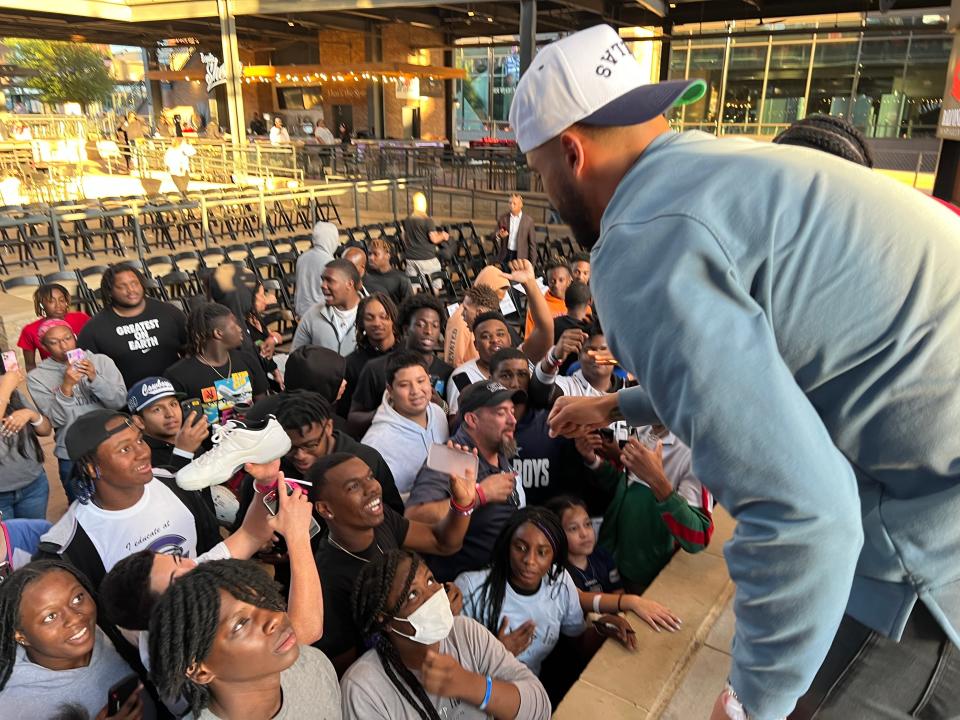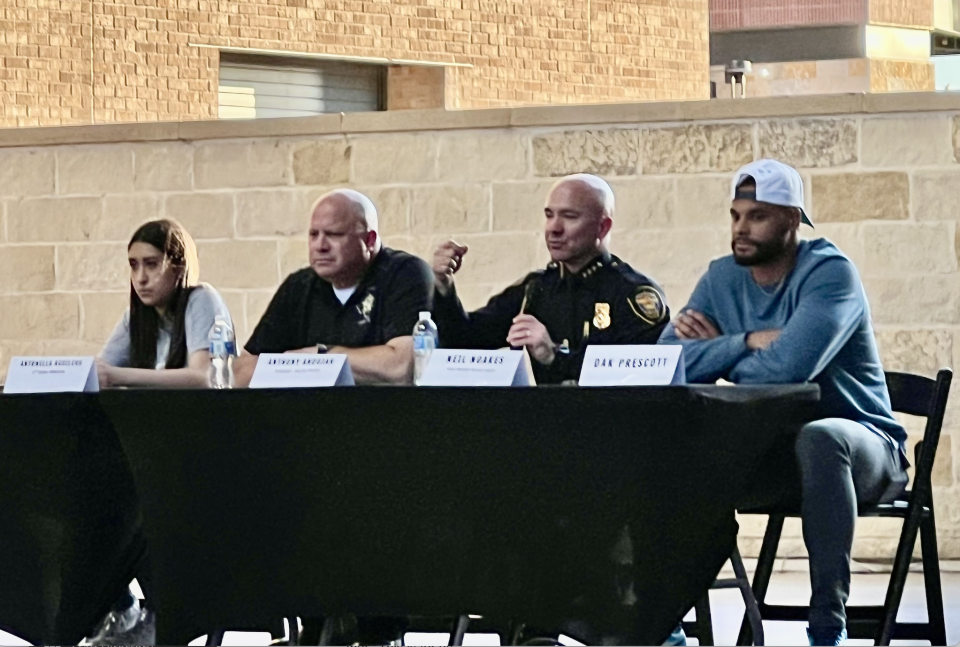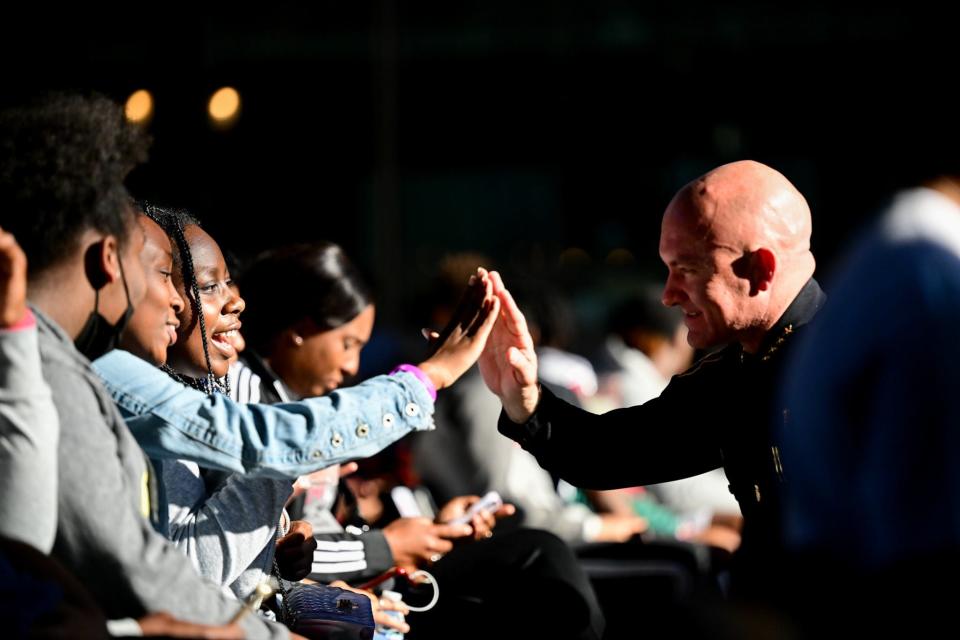'This is for real': Inside Cowboys QB Dak Prescott’s mission to build trust, alter police training
ARLINGTON, Texas — In a sprawling outdoor venue nestled between the Dallas Cowboys’ AT&T Stadium and the Texas Rangers’ Globe Life Field, Dak Prescott occupied the farthest left chair on stage.
Beside the Cowboys QB sat two city police chiefs, a local school district superintendent, a mental health specialist, and two high school students of color. Prescott's town hall was underway. The goal: Build trust between law enforcement and youth, humanizing members of each community. Prescott urged panelists and the student audience alike to speak honestly.
“How do y’all handle situations with people who are African Americans when they’re not being obedient, when they’re not understanding the situation, or when they’re not cooperating?” asked one teenage male of color during the Q&A portion. “Because it seems like y’all handle situations differently from Caucasians to African Americans.”
Asked a female student: “Do you think brutality is based off poverty?”
NFL NEWSLETTER: Sign up now for exclusive content sent to your inbox

Attendees said they valued the chance to ask these questions in a safe and open-minded forum. They also appreciated Prescott, who propelled roughly 200 students of color to spend a sunny Wednesday evening in May with local law enforcement.
“People in their mind today were like, ‘Oh, we’re going to see Dak,’” Dallas Carter High senior Aliya Larzeia said. “But at the same time, we’re going to be able to discuss our problems and how we feel.”
Prescott began his mission to build trust between law enforcement and communities of color after George Floyd was murdered by a Minnesota police officer in May 2020. The following week, Prescott pledged $1 million to “improve our police training and address systemic racism through education and advocacy in our country.”
“I couldn’t silence my inner voice anymore,” he told USA TODAY Sports. “Eventually I said, ‘I’ve got to do something.’ I’ve got to do something bigger than asking questions ... and I hope you all hold me accountable to it.”
In a 2021 USA TODAY/Ipsos poll, 77% of Black Americans said police don’t treat all Americans equally (54% of white respondents agreed). While Blacks make up 12.9% of the Texas population, they accounted for 16.2% of 2021 traffic stops in the state and 32.5% of physical force incidents, according to a racial profiling data analysis conducted within the Texas A&M University system. The research authors recommended further analysis since “dynamics of the situations are not included in the data.”
Locally, two white officers have been convicted of murdering unarmed Black males in the last five years. Dallas-based civil rights attorney David Henderson characterizes local Black sentiment not as angry or hostile.
“We’re scared of the police,” Henderson told USA TODAY Sports, “even when we need to call them for help.”
Through town halls and training, Prescott hopes to shift that dynamic.
After two years of research, several local grassroots events, and three sessions testing training curricula with officers and educators, Prescott’s Faith Fight Finish Foundation (FFF) has signed a deal with national public safety policy and training platform Lexipol, Prescott and Lexipol confirmed to USA TODAY Sports. Lexipol will transform a Prescott-curated law enforcement curriculum into virtual training that, with Prescott’s funding, will be nationally available and free. The course is scheduled to be filmed in mid-September and available by the first quarter of 2023. Lexipol has a presence in all 50 states and will market the course to its more than 10,000 customers.
"A continuous education and a way to weed out those who don’t truly have it in their heart to serve their communities,” Prescott said of his goal. “I’ve got to put all these police officers and I’ve got to put the community in uncomfortable positions for us to grow and create this empathy so we can educate each other that we are the same.”
Prescott’s determination to build trust has surprised local officers and community members. Jaime Castro, the Dallas Police Association Third Vice President and Latino Community Liaison, recalled his initial impression after a chance encounter turned into a more-than-hour-long discussion.
“I was like, ‘Dak, I’m going to be honest: We’ve never had anyone your status ever come to us and say, ‘What can I do to help?’'" said Castro, who now serves on Prescott’s advisory committee. “This is for real. He really does care about what we’re talking about.”
Can trust be rebuilt?
Prescott was emotional in a four-page Instagram post on June 3, 2020.
“I have the utmost respect for those of you with a passion for protecting and serving our communities,” he wrote in part in his statement. “(But) how can you claim to uphold the law when those within your own ranks don’t abide by it? You need to hold your own accountable!”
“As long as cops continue to profile blacks as a threat, cops will continue to be perceived as untrustworthy,” he wrote later in the post. “I stand to help our streets and communities trust one another!”
Prescott had decided his goal. The next question: How?
“We first educated ourselves about the differences in law enforcement (training requirements),” Prescott said. “And that was a mind-blower to me. That was almost a step back like, ‘Man, this may be tough.’”
Prescott mulled systemic concerns also, and a conversation with his uncle resonated. He recalled his uncle saying: “We should just get rid of the word ‘racism.’”
“Say it’s hate,” Prescott said. “Because at this point, it’s learned … so my point is I need to teach to unlearn. And the only way to unlearn is to educate.”
Research led Prescott and FFF executive director Shannon Mabrey Rotenberg to Council for Strong America’s eight-module CYCLE (Connecting Youth and Communities with Law Enforcement) curriculum. Courses covered de-escalation, communication, implicit bias and adolescent brain development.
After discovering how inconsistent officer mental wellness support was — Castro told Prescott he had not interacted with a mental health professional since entering service in 1999 — Prescott also commissioned the development of two additional modules: on community service, and on officer mental health and wellness.
“When I realized what our police officers are doing, I’m like, man — that’s scary,” Prescott said. “They’re not given a chance to do their job at the healthiest position because it all starts with your mental health.”
Tracie Keesee, the Center for Policing Equity co-founder and former NYPD Deputy Commissioner for Equity and Inclusion, has not encountered Prescott or CYCLE’s curriculum but spoke to USA TODAY Sports generally about Prescott’s goals.
“Kudos,” she said of the officer wellness addition. “Because we know for a fact that officers are also carrying trauma. This is not new but it’s also something that needs to be lifted up, needs to be acknowledged, and needs to be invested in. Because they’re bringing that to work with them.”
A 'night and day' difference in training

Prescott’s curriculum has attracted buy-in from local departments. Though none has mandated it, Dallas, Fort Worth and Arlington police departments each sent officers first to training in late 2021 and then to instructor training in June. Castro says the curriculum’s focus on understanding civilians is “night and day” different from the “warrior mentality” training he received when initially joining the Dallas Police Department in 1999.
Kim Vickers, who retired Aug. 31 as executive director of the Texas Commission on Law Enforcement (TCOLE), said the adolescent brain development coursework “mesmerized him.”
“I have never, in my history of law enforcement training, seen that type of training that I thought is extremely beneficial,” said Vickers, whose 43 years in law enforcement included multiple terms as president of the International Association of Directors of Law Enforcement Standards and Training.
Lexipol CEO Chuck Corbin believes Prescott’s donation will spur interest from law enforcement wanting to “understand the human element and who’s on the other side of the conversation.”
Could that perspective be sufficient to spur institutional change? Henderson is skeptical that equitable policing will result without legal pushes to change the enforcement and interpretation of laws, holding officers accountable and enacting stricter consequences for use of force. Keesee said measuring training efficacy is challenging amid divergent community-to-community needs and scant quantifiable targets. She recommended training and outreach efforts target patrol officers who most often interact with civilians, rather than chiefs and training specialists.
And training “cannot replace the need for local law enforcement to be on the ground with their respective communities, having these conversations,” Keesee said. “What it can be used for is a way to begin the conversation, to go in and help frame how you do it.”
In North Texas, that conversation has begun.
'I'd be damned if I stop'
Faith Fight Finish community activities have included an officer-student athlete barbecue dinner; local high school visits by a 35-year-old Black police officer and Breaking Barriers United founder Ryan Tillman; and a “Backpack and Hoodies” event in which students explained to officers why the garments were comfortable and then heard from officers why they generated suspicion. The foundation has also coordinated three town halls between officers and teens of color.
Conversations have broached prior experiences in police-civilian interactions — family members’ distrust, friends’ stigmas, officers’ traumatic calls — as well as shared affinities for rapper J. Cole and the Cowboys.
“The best way to create trust is to give input on both sides and allow them to get their problems out, allow them to say the things they feel most misconstrued about,” Prescott said. “To me, it was, make (law enforcement) better and then the people will understand that, ‘This is for us.’”

Prescott dismisses the notion that he’s siding with officers in programming, instead preferring to facilitate dialogue.
“The person in the middle trying to bring everybody together,” said Aliya Larzeia.
“He’s actually trying to get both viewpoints,” added her sister Adia Larzeia, a sophomore at Prairie View A&M. “He’s not like, ‘Oh, you have to listen to the law enforcement.’ As a youth, you still have a voice and opinion. You’re still entitled to hear what we have to say.”
Fort Worth police chief Neil Noakes says Prescott’s pitch on youth involvement was clear: “They have to be at the table or we go nowhere.”
Prescott, Rotenberg and the foundation hope conversations advance as officers receive more access to relational training and community-building events.
Faith Fight Finish hasn’t yet invested $1 million, and Prescott views his 2020 pledge as only an “initial” give.
“When I hit the million, at this point, that’s just checking off what we pledged, but I’d be damned if I stop,” Prescott said. “I’m blessed enough that I’ll have more money at that time than I have right now to be able to put more money into it. I’ll have more connections and more people involved.
“Funding will never be the issue.”
Prescott believes he’s seeing micro-level impacts, be it individual officers learning from students or high-risk students finding mentors among officers.
“I’ve never left a town hall, never left an event without feeling like we’ve changed somebody’s mindset, perspective and made the officers better,” he said. “Let’s figure out a way for us to answer these questions together.”
Follow USA TODAY Sports’ Jori Epstein on Twitter @JoriEpstein
This article originally appeared on USA TODAY: Cowboys QB Dak Prescott is on a mission to rebuild trust with police

